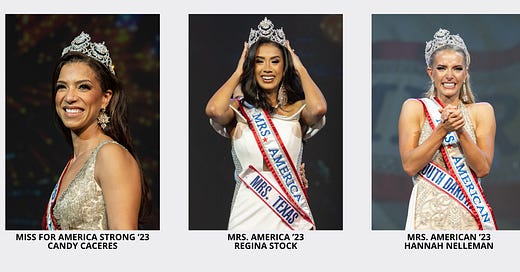Most of the people I’ve talked to about Ballerina Farm find themselves compelled to consume Hannah Neeleman’s online persona because the math doesn’t make sense. A suspension of disbelief feels necessary when asked to consider that someone with seven young children could take care of those children; homeschool some of those children; help attend to a 328 acre ranch teeming with cattle, hogs, donkeys, horses, ducks, chickens, and cats; cook seemingly every meal from scratch; prevent her house from gobbling her whole; find time to dance; and do it all with a smile on her face. BF attracts so many eyeballs because Neeleman is the embodiment of a maternal ideal wholly impossible for most of us to attain. She’s the Gwyneth of moms, the Barbie of moms, the Martha Stewart of moms. This is why we stumble over ourselves trying to ascertain how many babysitters are lurking behind the scenes, why we comb Reddit threads looking for context clues, why we continuously ask ourselves what is up with all things BF. And since Neeleman won the Mrs. America(n) pageant, my DMs have lit up with a resurgence of that what is up sentiment. She can do it all and she’s a beauty queen. It’s a lot!

Hannah Neeleman is not new to beauty pageants. As a teenager, she competed in Miss Springville (and won). Later, she competed in Miss Utah, Miss National Sweetheart, and Miss New York City (which she won). Last year, she won Mrs. Utah and competed in the Mrs. America pageant. And this year, of course, she won Mrs. America(n). A word about the Mrs. America vs. Mrs. American confusion. As far as I can tell, both pageants are held by the same organization. Mrs. American seems to be a newish addition, whereas the first Mrs. America pageant was held in 1938. Because Mrs. American exists within the Mrs. America umbrella though, I’m going forward with my analysis assuming they communicate and uphold similar mores and values.
Before I attempt to understand why Neeleman’s participation in the Mrs. America(n) beauty pageant has drawn so much attention (albeit in my tiny corner of the internet lol), I want to dig into the history of Mrs. America specifically and the legacy of Miss America more broadly. Much of this history is courtesy of Looking for Miss America: A Pageant’s 100 Year Quest to Define Womanhood, written by Margot Mifflin. It’s such an illuminating read, and reveals so much about why certain feminine ideals were codified by pageants and also why some of these ideals are still stubbornly sticking around today.
The first Miss America pageant was held in 1921, and many of the pageant’s early contestants required chaperones, were prohibited from going to bars or nightclubs, and had to be single, childless, and not divorced. Miss America is about beauty norms, sure, but it’s also about our cultural preoccupation with feminine “purity.” It’s about the male imagination more than it is about real women. It’s also bizarrely about mothers even if those mothers are virgins.




